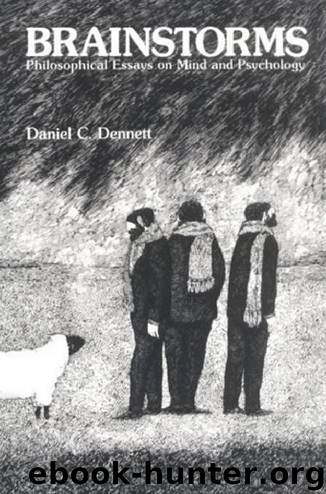Brainstorms by Daniel C. Dennett

Author:Daniel C. Dennett [Dennett, Daniel C.]
Language: eng
Format: epub
Published: 2011-02-05T05:00:00+00:00
Toward a Cognitive Theory of Consciousness 171
accomplished without any inner eye or introspective faculty beyond the machinery invoked in the model.
(6) Our feelings of special authority in offering introspective reports
-^the basis for all the misbegotten theses of introspective incorrigibility and infallibility—arise from the fact that our semantic intentions, which determine what we want to say, are the standards against which we measure our own verbal productions; hence if we say what we mean to say, if we have committed no errors or infelicities of expression, then our actual utterances cannot fail to be expressions of the content of our semantic intentions, cannot fail to do justice to the access we have to our own inner lives.
(I claimed inContentand Consciousness that this fact explained how we were, in a very limited and strained sense, incorrigible with regard to the contents of our awareness or consciousness. Now, thanks to the relentless persuasions of John Bender, William Talbott, Thomas Blackburn, Annette Baier and others, I wish to claim that this fact explains not how we are in fact incorrigible, but rather why people—especially philosophers—so often think we are. The fact does provide for what Gunderson calls the investigational asymmetry of some first-person claims, but the asymmetry is not profitably to be viewed, as I used to claim, as any sort of even limited incorrigibility.) VI
Having an inner life—being something it is like something to be—is on this account a matter of having a certain sort of functional organization, but the only natural entities that could be expected to have such functional organizations would be highly evolved and socialized creatures. The prospect of a robot artificially constructed to replicate such a functional structure is not ruled out, but when one reflects on the activities such an entity would have to engage in to be more than an instantaneous version of such a system, the claim that it would be conscious loses—at least for m e ^ t s implausibility. We might not have the imagination to engage such a thing in interpersonal relations; it might not seem, in its metallic skin, to have an inner life or any prospect of an inner life. Such appearances are unreliable, however, for consider the possibility of there being a truly conscious entity (whatever one supposes this involves) that was just like us except that it operated on a time scale ten thousand times slower than ours. We would have a very hard time recognizing any of its day-long emissions as speech acts, let alone witty, cheery, doleful, heartfelt speech acts, and its ponderous responses to cuts and bruises would not easily 172 BRAINSTORMS
enliven our sympathies; but if so, we would ex hypothesi be ignoring a genuine, conscious person among us.
When we wonder if something or someone is conscious, it is tempting to view this as wondering whether or not a special light is turned on inside. This is an error, however, as we can see by asking questions about our own cases: was I conscious (or conscious
Download
This site does not store any files on its server. We only index and link to content provided by other sites. Please contact the content providers to delete copyright contents if any and email us, we'll remove relevant links or contents immediately.
| Anthropology | Archaeology |
| Philosophy | Politics & Government |
| Social Sciences | Sociology |
| Women's Studies |
The remains of the day by Kazuo Ishiguro(8999)
Tools of Titans by Timothy Ferriss(8396)
Giovanni's Room by James Baldwin(7346)
The Black Swan by Nassim Nicholas Taleb(7129)
Inner Engineering: A Yogi's Guide to Joy by Sadhguru(6796)
The Way of Zen by Alan W. Watts(6614)
The Power of Now: A Guide to Spiritual Enlightenment by Eckhart Tolle(5782)
Asking the Right Questions: A Guide to Critical Thinking by M. Neil Browne & Stuart M. Keeley(5775)
The Six Wives Of Henry VIII (WOMEN IN HISTORY) by Fraser Antonia(5515)
Astrophysics for People in a Hurry by Neil DeGrasse Tyson(5190)
Housekeeping by Marilynne Robinson(4448)
12 Rules for Life by Jordan B. Peterson(4304)
Ikigai by Héctor García & Francesc Miralles(4274)
Double Down (Diary of a Wimpy Kid Book 11) by Jeff Kinney(4272)
The Ethical Slut by Janet W. Hardy(4253)
Skin in the Game by Nassim Nicholas Taleb(4250)
The Art of Happiness by The Dalai Lama(4130)
Skin in the Game: Hidden Asymmetries in Daily Life by Nassim Nicholas Taleb(4007)
Walking by Henry David Thoreau(3962)
